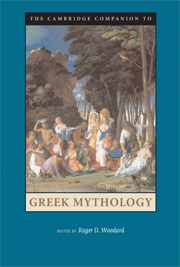Book contents
- Frontmatter
- Introduction: Muthoi in Continuity and Variation
- Part I Sources and Interpretations
- 1 Lyric and Greek Myth
- 2 Homer and Greek Myth
- 3 Hesiod and Greek Myth
- 4 Tragedy and Greek Myth
- 5 Myth in Aristophanes
- 6 Plato Philomythos
- 7 Hellenistic Mythographers
- Part II Response, Integration, Representation
- Part III Reception
- Bibliography
- Index
1 - Lyric and Greek Myth
from Part I - Sources and Interpretations
Published online by Cambridge University Press: 28 March 2009
- Frontmatter
- Introduction: Muthoi in Continuity and Variation
- Part I Sources and Interpretations
- 1 Lyric and Greek Myth
- 2 Homer and Greek Myth
- 3 Hesiod and Greek Myth
- 4 Tragedy and Greek Myth
- 5 Myth in Aristophanes
- 6 Plato Philomythos
- 7 Hellenistic Mythographers
- Part II Response, Integration, Representation
- Part III Reception
- Bibliography
- Index
Summary
In the history of Greek literature, poets of “lyric” are conventionally associated with the archaic period. Some would go so far as to call this period a “lyric age,” to be contrasted with an earlier age represented by Homer and Hesiod, poets of “epic.” There is in fact a book about the archaic period bearing the title The Lyric Age of Greece (Burn 1960). The archaic period ended around the second half of the fifth century BCE, to be followed by the so-called classical period. The archaic period is thought to have ended with the lyric poet Pindar, while the classical period is thought to have begun with the tragic poet Aeschylus, even though these two literary figures were roughly contemporaneous.
There is a lack of precision in the general use of the term lyric. It is commonly associated with a variety of assumptions regarding the historical emergence of a “subjective I,” as represented by the individual poet of lyric, who is to be contrasted with the generic poet of epic, imagined as earlier and thus somehow less advanced. By extension, the subjective I is thought to be symptomatic of emerging notions of authorship. Such assumptions, it is argued here, cannot be sustained.
Lyric did not start in the archaic period. It is just as old as epic, which clearly pre-dates the archaic period. And the traditions of lyric, like those of epic, were rooted in oral poetry, which is a matter of performance as well as composition (Lord 1995: 22-68, “Oral Traditional Lyric Poetry”).
- Type
- Chapter
- Information
- The Cambridge Companion to Greek Mythology , pp. 19 - 51Publisher: Cambridge University PressPrint publication year: 2007
- 6
- Cited by

